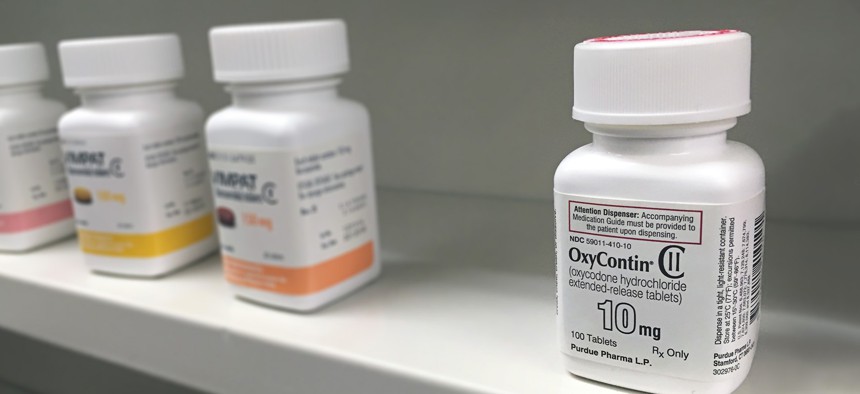Purdue Pharma Funds Prescription Monitoring Program Upgrade In Virginia


Connecting state and local government leaders
The $3.1 million grant comes just one week after a Washington city announced it will sue the company for neglecting black market trafficking of its drug, OxyContin.
Virginia Gov. Terry McAuliffe announced on Thursday that his state’s Prescription Monitoring Program has been awarded a $3.1 million grant to integrate its data into doctors’ and pharmacists’ daily workflow.
The grant, which is funded by Purdue Pharma, will allow the Department of Health Professionals to link the state PMP with electronic health records—a step the governor says “makes the PMP easier and more likely for physicians to use.”
PMPs like the one in Virginia allow prescribers and pharmacists to keep track of the prescription history of patients, making it easier to identify those individuals who may be at risk for potential opioid abuse.
“This initiative will put information that doctors need to make better informed prescribing decisions at their fingertips,” Dr. Gail Cawkwell, Purdue Pharma vice president and chief medical officer, said in a statement regarding the initiative. This isn’t the first time the company has funded projects to strengthen these data systems. For example, in 2011 they provided $1 million to support the operation of a prescription drug monitoring program in Florida.
Grants like these from the pharmaceutical industry are not uncommon. They can do legitimately good work, and they play well from a public relations perspective.
And, it must be said, there is perhaps no other company in greater need of positive PR at this point in the opioid epidemic than Purdue Pharma.
Just over one week ago, the mayor of Everett, Washington—a city of 100,000 people located north of Seattle—announced that his government will be suing Purdue Pharma, the maker of OxyContin. The city claims that the company knowingly turned a blind eye to black market sales of the drug.
This first-of-its-kind lawsuit is based, in part, on an investigation carried out by the Los Angeles Times which revealed email documentation that the company had “extensive evidence” that its drug was being widely trafficked across the nation, but in many cases did nothing to cut off the flow of pills, or coordinate with law enforcement.
One drug ring in particular, which the Los Angeles Times investigation claimed was monitored by Purdue, supplied gang members and others who then brought the drug to Everett. In 2010, at the height of the crisis, use of the OxyContin was so rampant, it was involved in more than half of the crimes in the entire country.
Lawyers representing Everett accuse the company of gross negligence, creating a public nuisance, and argue that Purdue should cover the cost of dealing with the opioid epidemic—which has since transformed into a fight against widespread heroin use.
As the Los Angeles Times reports, the sole detox center in Snohomish County, where Everett is located, has only 16 beds, but on any given day the jail may house up to 160 people in need of detox from heroin.
Purdue Pharma disputes the findings of the LA Times investigation and, when contacted for comment regarding the pending litigation from Everett, a representative of the company provided this statement:
“We share public officials’ concerns about the opioid crisis and we are committed to working collaboratively to find solutions. Although OxyContin accounts for only 2% of all pain-related opioid prescriptions, Purdue is an industry leader in abuse deterrence as we were the first pharmaceutical company to develop an opioid medication with abuse-deterrent properties.”
Although this is the first time a municipality has sued Purdue regarding what the company knew about black market trafficking of its drug, the company is no stranger to legal trouble.
In December 2015, the company agreed to pay the state of Kentucky $24 million over the next eight years to settle a lawsuit originally filed in 2007 that accused the company of misleading the public about the addictiveness of its potent prescription painkiller.
Many experts contend that it was false marketing—Purdue originally branded OxyContin as “abuse resistant”—and the company’s close relationship with painkiller prescribers that fueled the opioid epidemic now sweeping the nation.
Quinn LIbson is a Staff Correspondent for Government Executive’s Route Fifty based in Washington, D.C.

NEXT STORY: Maine Gov. Moves to End Refugee Resettlement; L.A. Moves on Its 2024 Olympic Bid





